#searchable archives ONLINE
Text
Me on literally any platform: you will not be mislabeling old photos with incorrect contexts today. Not if I can help it.
#dogblr#the one about the yukaghir woman and laika dog popped up on my feed as ‘native and wolf’#so of course I could not resist#what baffles me about so many of these old photos being taken out of context is#SO MANG OF THESE PHOTOS ARE FROM PUBLIC FUCKING ARCHIVES#searchable archives ONLINE#like babe. babe. use reverse Google image search I’m. egging#begging#like the eastern Canadian Inuit dog one#of a dog next to children#often used as a ‘proof’ of the malamutes size#it is incredible that once you start pointing out how people take said dog photos out of context#they stop posting them as this proof#this ain’t groceries anymore kids#these are public photos and many of them aren’t even old (like 1950s) hilarious#‘we’ll of course every old black and white photo go a native person must be old’#says the white folk#please just. get offline
27 notes
·
View notes
Text
I figured out a day or two ago that SSO Ridethrough still exists. The unique domain name just expired, so it's back to using a wordpress url, which is why a bunch of the old links don't work
So if you guys want to see the Old Quest Dialogue (like 2018 and earlier), look for ssoridethrough.wordpress.com (not linking it directly because we all know tumblr can be weird about links). If a link on the site doesn't work trying the search function instead, so far it's worked for me.
#sso#star stable online#starstableonline#I was in the processing of archiving a bunch of it on the wayback machine#and also in documents#and realized 'oh wait she switched to a unique domain rather than using the wordpress one oooh'#which answers why so many of the links don't work but the pages actually still exist#I'm still in the process or archiving it's just a long process and I've been hella busy#god I hope one day I can get my own dialogue reference site up and running#boatload of work but also so handy for the community#like I have videos and screenshots and documents of the events and quests going back to 2019 or maybe 2018 so like#I do have all that stuff it's just not very searchable or available for people
80 notes
·
View notes
Text
I’ve had a years-long crisis now trying to figure out how I can participate in fandom without losing my mind
#sharing fanart/fanfic keeps stumping me bc creating new blogs for every short lived interest is nonsensical#but also having a fandom presence/searchable archive of all my fan works ever is not appealing in the slightest#when I started posting fanart as a teenager I wanted to make online friends and talk about my interests#but as I’ve gotten older idgaf about having a following or even making new friends#I just need somewhere to scratch the hyperfixation itch until it goes away LMAO#the main reason why I’m Like This is bc I usually end up liking media w the most insufferable fandoms#like I don’t believe fandom is this sacred space where I can just be free or whatever historically that has never been the case#and I can’t really do the anon neutral art account thing bc I have opinions and love blocking annoying ppl#anyway I’ll just keep posting sporadically on here I guess
0 notes
Note
Some insight into the designs and fashion of the 20s would be so cool, especially since it's kinda hard these days to sift through just costume listing :'0
Yeah, sadly, the usefulness of a Google search is greatly diminished these days. You can still find articles written by actual human beings and genuine historical garments, but you have to wade through a lot of junky costumes and AI bullshit to get there.
I can't possibly fully explain 1920s fashion here, though. It's a broad enough topic to write a sizable book about...which is why people have written many books about it. Check out some books. There are things you can get pretty cheap from resellers, everything from academic screeds about the politics behind the fashion trends of the time, to clothing catalogue compilations from the 20s, to giant coffee table books full of glorious photos.
Here's a PDF version of one of those clothing catalog collections. There's an entire preface about 1920s fashion in general too.
There are some pretty well made blogs about the topic out there as well. Vintage Dancer is one of them. The front of the site is unfortunately kind of cluttered with ads for costume apparel and modern clothing inspired by the 20s, but scroll past that to the historical bits and you'll find pertinent things.
There are some great fashion YouTubers too, like Karolina Zebrowska. Although she's not focused heavily on 1920s fashion, she talks a lot about early 20th century fashion in general. She also talks a lot about the historical context of those fashions.
Also, try online museum displays. The Met Museum has a searchable collection, for instance. Look up 1920s fashion, 1920s dresses, 1920s suits, etc.
Cameras were popular and accessible in the 1920s. Look at pictures of what people actually wore. You can find these images in free government photo archives, or licensing libraries like Getty Images (you don't have to license anything to look at it). And there's always Shorpy. Poor old, underappreciated Shorpy. Their archive is searchable.
1K notes
·
View notes
Note
I'm doing a College class on Ancient Foods. My focus is on Honey like the different recipes and usages in Medieval era. I found like a couple recipes, a thing on religious relation ("Milk and Honey of Paradise") /Crusades, medicinal use, and possibly bees/beeswax because I was struggling to get something.
Y'all have any recommendations?
(I've brought Zoe in on this one; the following is a collaborative effort. Also I'm assuming you have access to your university library so you can get ahold of the cited material below quickly and for free.)
Can you include beverages? Honey is the main ingredient in mead, which should give you a lot to talk about. Susan Verberg is the premier researcher on medieval mead, and has some excellent works on both mead making and honey production. She has a website at https://medievalmeadandbeer.wordpress.com/ where you can find both her formal publications and her blog.
If you do want to talk about beverages, there were other medieval drinks that used honey. Some citations for you:
Breeze, Andrew. “What Was ‘Welsh Ale' in Anglo-Saxon England?” Neophilologus, vol. 88, no. 2, 2004, pp. 299–301.
Fell, Christine E. “Old English ‘Beor’." Leeds Studies in English, vol. 8, 1975, pp. 76-95.
You can also go into cultural symbolism; here are a couple on that:
Enright, Michael J. Lady with a Mead Cup: Ritual, Prophecy, and Lordship in the European Warband from La Tène to the Viking Age. Four Courts Press, 2013.
Rowland, Jenny. “OE Ealuscerwen/Meoduscerwen and the Concept of ‘Paying for Mead'." Leeds Studies in English, vol. 21, 1990, pp. 1-12.
Also you might want to look into the general concept of the "mead of poetry" from the Old Norse sources. You can find the origin story for that in the Prose Edda, I believe.
Definitely check out https://www.foodtimeline.org for recipes with honey during the period - they have more than you'd expect. There's also a few medieval cookbooks you can parse through. Here's an online one you can sort through that does a great job modernizing the translations: https://www.medievalcookery.com/etexts.html
As for honey itself -- there's actually quite a bit of research on that! Honey was quite a specialized trade, and most of the medieval world used it for sweetener, so there's a good amount of research.
A few leads:
honey as an alternative to sugar, which was expensive, imported, and could indicate class
honey grading: honey was graded based on location/provenance, type (lavender, orange blossom, etc.), and also by grade. However, their method of grading was very different to our modern one.
honey as a preservative, not just for flavor
Articles on this subject:
(DEFINITELY this one!!) Fava, Lluis Sales, et al. “Beekeeping in Late Medieval Europe: A Survey of Its Ecological Settings and Social Impacts.” Anales de La Universidad de Alicante. Historia Medieval, no. 22, 2021, pp. 275-96, https://doi.org/10.14198/medieval.19671.
Wallace-Hare, David, editor. New Approaches to the Archaeology of Beekeeping. Archaeopress, 2022. JSTOR, https://doi.org/10.2307/j.ctv2b07txd.
Verberg, Susan. “Of Hony: A Collection of Mediaeval Brewing Recipes for Mead, Metheglin, Braggot, Hippocras &c. — Including how to Process Honey — from the 1600s and Earlier,” 2017. Academia.edu.
If you want to look more into the medicinal usage, Cockayne's Leechdoms, Wortcunning, & Starcraft collects all the medical & scientific texts of the Old English period. It's old enough to be public domain, so it's available on the Internet Archive and HathiTrust in searchable form, meaning you can just ctrl-F "honey" and see what comes up.
Let us know how it goes!
58 notes
·
View notes
Text
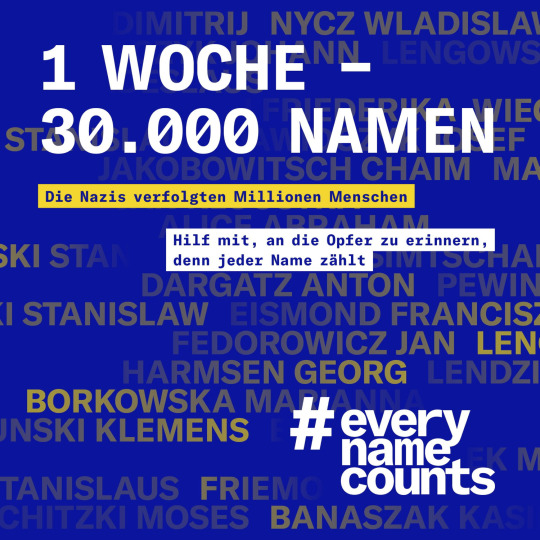
[trans: 1 week—30,000 names. The Nazis persecuted millions of people. Help remember the victims, because every name counts.]
if you do one thing this holocaust remberance day i want to recommend contributing to the international center for nazi persecution/arolsen archive’s every name counts initiative.
The documents in our archive contain information about the fates of 17.5 million people. We have already scanned them. But to make them visible in our online archive and enable people all over the world to find them there, the information they contain has to be entered into a database – and that’s where we need your help!
they present you with a scanned card that hasn’t been catalogued in the archive. you enter the name, birthdate, and other information so they can now be searchable in their database.
i just finished filling one out for riwka genik, a jewish holocaust survivor born in 1900 in romania.
i recommend this because it doesn’t involve any money and your work can mean the difference of whether someone finds their family member or not in these records.
#it’s this archive that helped me find out what happened to my grandpa and his family#so it would mean a lot to me#we remember
59 notes
·
View notes
Note
maybe it’s because I’m a newish follower but I haven’t seen your posts on zotero…. say more pls… how do u make use of it… what are your methods/systems to maintaining it or coming back to it? I’ve only heard of it mentioned once by a professor I admire (I asked how do u keep track of all the articles and texts lol) but then completely forgot to actually look into it.
>:) zotero is a free* and open-source citation manager, meaning it's designed to help you keep track of books, articles, podcasts, archival material, &c &c that you may be wading through for whatever reason. the basic structure is just a library of metadata: authors, publication info, and so forth. you can organise this into however many folders and subfolders as you might want, and (assuming you make sure the metadata are accurate) zotero also allows you to generate a bibliography from any of these folders with 1 click. also, it gives you a convenient notes function so that your notes are all attached to the material they correspond to (& are text-searchable), and when you use it as an app downloaded onto your computer (which you should), it automatically syncs with the web library, meaning your work is basically cloud-backed or whatever. you should also download the zotero web connector extension onto your browser; then, when you're looking at an article, book, or webpage online, you just click the extension and it'll let you put all of the metadata into your zotero library. i have no idea how people do large amounts of reading on any topic without a citation manager tbh. zotero.org to change your life forever
*u get a limited amount of storage for free, but the paid storage plans are at p reasonable rates (comes to 10 USD/month for unlimited, and if you upgrade in the middle of a yearly pay cycle they pro-rate it)
79 notes
·
View notes
Text
"Undiscovered..."
Definitely no one working in the library selected these menus, had them transported, organized them, described them, preserved them, maintained the system for sharing information about them, kept an open reading room for investigating them. They couldn't have! They're "undiscovered."
Definitely no one in the library made a popular crowdsourcing project, "What's on the Menu?" for getting them transcribed and searchable, and while it's not currently updated still has thousands displayed digitally for easy access at home. Online use is use too.
Nope. They're "undiscovered."
You thought you might leave an article about archives and special collections without dust? Nope! The "dusty archives" trope sneaks right in right at the end.
smh.
“Whenever you use ‘musty’ [or ‘dusty’] in an article about archives, the ghost of Schellenberg kills a kitten” - a quote from Brad Houston. This blog highlights the use of tropes like “musty,” “dusty,” and “discovery” in articles about archives and libraries which are relied upon to demonstrate irrelevance, or erase the people doing archival labor.
Poor kitty. We lost another one.

(Cat via @lovemrwar)
106 notes
·
View notes
Text
The Interactive Fiction DataBase - IFDB

What is the IFDB?
The IFDB, or Interactive Fiction DataBase, is a game catalogue, recommendation engine, and a platform to play games requiring an interpreter (to run the code).
As a catalogue, the IFDB is meant as a place to create a bibliography of IF games created throughout the years (over 12 thousands!), to leave a trace that these existed. It is maintained by its members. Anyone can join and add a listing or fix a mistake.
You can also find listing for past IF competitions!
As a recommendation engine, the IFDB provides not only lists of the best-rated entries, but will show you games that you may enjoy based on the ones you've played/rated or what other members have played/rated. Entries are also categorised by tags, which are all searchable.
Members are also able to create lists to recommende games they've enjoyed! Or leave reviews of those games too!
Finally, some games may require an interpreting engine to run. Those interpreters can be sometimes difficult to track down or to set up, especially for new players. The IFDB has a system that will allow you to play those games directly in your browser by clicking the button : Play Online (only available if the game has been uploaded through the IF Archive).
Why is the IFDB important?
The internet is a rapidly changing place. Preserving information is not only important for future generations, but can help current generations find information about what is happening now. Archiving creates a historical record of what the IF landscape looked like.
Along with the IF Archive (which archives IF games), the IFDB makes viewing the history of IF much easier to browse.
However, the IFDB lacks in many aspects. Not every IF community is aware of the database, which means many projects do not appear in this catalogue. While the IFDB has currently over 12k listings, the VNDB (the Visual Novel DataBase) has over 40k!
The IFDB is also lacking in entries in languages other than English...
The IFDB accepts any listing for games, made in any program, as long as said game is an Interactive Fiction game and has had a playable version available somewhere at some point (so it accepts WIPs with demo).
/!\ Do not create a page for announced project without a release ! /!\
Why create an IFDB page for your game?
Aside from being part of preserving the history of IF (which is the big thing), and be able to share your work to a different part of the community, the IFDB is a great place to get and leave long-form reviews for entries.
If your project was coded in a program that requires an interpreter, it is a great place to host your game without worrying about newer players having to find and set up an interpreter.
If you have been part of an IF competition, or received accolades for your project, this is also a good way to showcase those achievements.
Finally, the IFDB is also a point of reference for IF Awards like the XYZZY and the IFDB Awards.
How do you create an IFDB page?
/!\ Please check that the game listing you want to add has not been added first! /!\
To create an IFDB page, you need to set up an account and be logged in.
Then click on Add a Game Listing, on the right menu in the main page. You will get the following page:
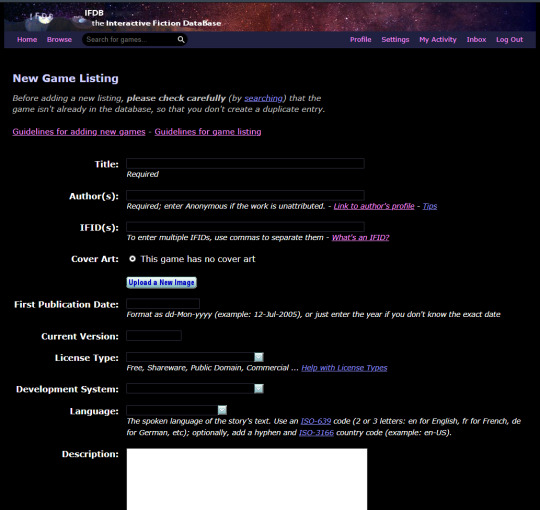
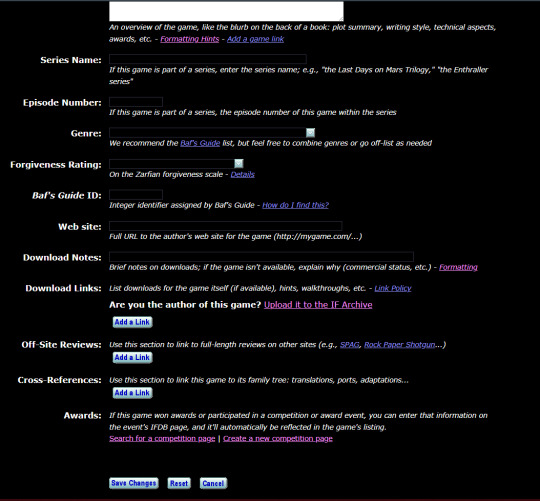
(You should read through the Guidelines the first time you add a listing, they are located at the top of the page)
Though it looks long, there are only very few information required to create a page:
The title
The name(s) of the author(s)
It is recommended to fill in the date of first publication, development system (program used to code), language, IFID (if available) description of the game, and genre.
As for being able to play the game, you have two (non-exclusive) options:
list the URL of the website where the game is hosted
list the download URL of the game (can be done through the IF Archive, only if you are the author of the game!)
Note sure what something is? A description (or a link towards explanations) of what is expected is included for almost all items. You can also include information that is not listed in the drop-down case (like the System or language).
When you are happy with it, click Save changes.
You can also fix, edit, or delete information at any moment. You just need to click on the link Edit This Page at the bottom of the game page.
How do you add Ratings, Reviews and Game Suggestions ?
Logged in with your account, you have the possibility of leaving ratings and reviews on a game page. You can also help the IFDB algorithm by suggesting similar games to an entry.
The process is fairly straight-forward (clicking on the stars for the rating, clicking Review it for the review, and clicking Suggest similar games, for the suggestions). Thought you can find further explanations here, if you follow what the website is asking, you should not have any difficulty to complete the task !
If you review enough games, your name can end up on the main page!
How do I create a Competition Page?
Have you participated or organised an IF competition? Or are you cataloguing previous editions?
You can create a separate page for a Competition by clicking on Add a Competition Page on the right menu of the main page. You will then get the following page:

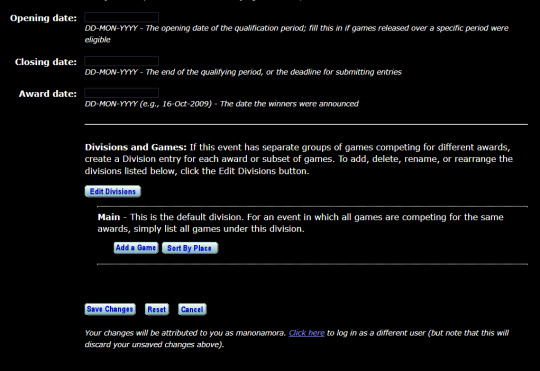
Then it is a matter of filling the different relevant items.
The Competition Page allows for divisions within competitions (e.g. : the EctoComp had 2 categories, made under 4h and over 4h) and, if needs be, ranking.
Important Note: the competition entries need to already be listed in the IFDB to be added to a competition page.
What are Lists and Polls?
Lists and Polls are two other tools that interact with game entries.
Lists, also called Recommendation Lists, are lists a member will curate with games they are recommending to other members or viewers of the IFDB. Some are general (like best game ever) while others are more specific (like games with an AI that is nice). They are akin to public collections on Itch.io.
Polls are... polls.
Note: If a game is included in a poll and/or a list, these will appear on the game's page.
~~~~
TLDR: create an account, help preserve the IF landscape by recording its history, review games too :P
If I missed something, or something is unclear, let me know so I can edit it!
373 notes
·
View notes
Text

Explore our Archives for American Archives Month
Did you know that October is American Archives Month? Did you know that the Hennepin County Library has over 500 archival collections waiting for you to explore? Our collections include everything from personal diaries from the 1800s to thousands of professional newspaper photos to the records of grassroot and community groups. Each collection has a searchable, online inventory (called a finding aid). When you find something in a finding aid that piques your interest, visit us at the Minneapolis Central Library to see it for yourself.
Can't make it downtown? Many of our archival records are available in our Digital Collections. Or, contact us for help accessing undigitized materials.
47 notes
·
View notes
Text
Ok, some time ago I told @transgenderer something to the effect of "if you want to acquire a good understanding of the cross-linguistic patterns in phonology, you kinda just have to read a bunch of grammars and phonology papers; it's difficult to find a source which summarizes all the data comprehensively and neutrally". And that's unfortunately true, but crucially I did forget to mention the existence of searchable typological databases. For phonological inventories there's PHOIBLE, for general language structures there's WALS, there's also a lot of data at the UCLA Phonetics Lab Archive, and for rare features and putative universals, there's the Universität Konstanz Rara & Universals Archive. There used to be something specifically for phonotactics, the World Phonotactics Database at http://phonotactics.anu.edu.au/, but it's no longer online. Apparently they are planning to bring it back eventually.
These are all great starting points for getting a sense of what does and does not occur in language and how widely. None of them (well, excluding the UCLA Phonetics Lab Archive because that's not really a typological database) should be trusted about any specific language without consultation of the relevant literature. Despite best efforts on the parts of the people who organize these projects, the fact is that many languages are simply very poorly documented and ill-understood, and these databases must make a choice on how to code the relevant data points, leaving aside crucial information about the level of certainty. On top of that, especially before recent times many authors used idiosyncratic notation that may be ambiguous or have been misunderstood by the people entering the data into the database, etc.
PHOIBLE is especially sensitive to the fact that what phonetic symbols are assigned to the phonemes of a language is to some extent an arbitrary choice on the part of whoever is doing the analysis. Usually you'll pick something like the most common phonetic realization of the phoneme, or the realization in the least marked environment, or something like that, but ultimately (moderately controversial claim incoming) there's no ascertainable ground truth to what the underlying values of individual phonemes "really are". The whole point of phonemes is that they have a range of values in different environments! So there's ground truth to phonological system as a whole, and assigning specific phonetic symbols to each phoneme is a convenient way to distill the gist of phonetic realization at a glance, but it's ultimately kind of arbitrary. Looking at phoneme inventories can give you a sense of the kind of phonetic features which tend to be contrastive crosslinguistically, but but you have to be very careful interpreting the data.
Uh, right, so these databases are useful tools, especially because they're searchable. But you have to be really careful with them.
59 notes
·
View notes
Text
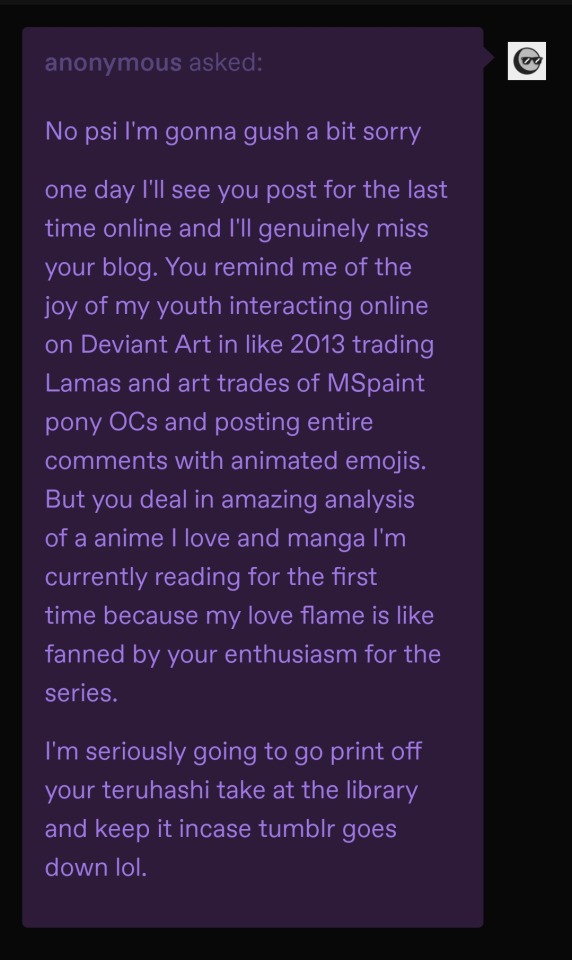
🥺🥺🥺 not 2 be sappy on main but omg I actually started off in Deviantart ages ago, that was the closest thing to social media for me until the tumblr migration lol. But I never really interacted with people on there, and even upon moving to tumblr, never really interacted with people here too often either. At first I had my main blog which was meant to be more professional since I was selling art to get a little college income, so I didn't really make too many irrelevant posts. Then I decided that I wanted to be able to reblog art and support other artists, so I made a side blog where I carefully curated and tagged the posts I reblogged. I made a few original posts but no one ever interacted, and eventually I realized that people only ever sent me asks there if I tagged anything wrong. Also I found out that adding stuff like series and character tags to a reblog on tumblr is basically useless because the op will pretty much always tag those things which makes it searchable on your own blog even if you don't tag it yourself. And if op DIDN'T tag it those things, your tags will make the post searchable on your blog but NOT in the general search, so it doesn't give op any more of a boost than just reblogging it tagless. So I made another sideblog, which I still have today, and I just rapidfire reblog literally anything I find shareworthy lol. Not any interaction there but at least I'm not wasting my time meticulously tagging strangers posts hsfjdlshfks. Since I was best friends with a big name fan in my main fandom (we became friends when I left a long emotional comment on their fanfic btw <3), I helped run some small fandom events and met more people as well. When I switched fandoms, it was a fandom event that gave me a new friend too, my posts never got any traction. Large fandom discords didn't really work for me either. But on this blog I was lucky, and for the first time people started like actually responding to my comments and posts, and get conversations going! And genuinely that's what's kept my brain rot so powerful I think, because bouncing ideas off each other and joking around and shitposting is genuinely the most fun I've ever had online!! I have to thank desta and oatmeal for the fun times especially, and hillbilly---man left really nice comments on my first few fics that really encouraged me, and I always have fun trading ideas with alienn, saikikthoughts, and crookedlyinnernightmare, plus everyone else who's on here, that's too many people to type out. AND I TYPED UP A BUNCH MORE STUFF BUT TUMBLR FUCKING DELETED IT!! Are you shitting me.... Well I think I remember saying that even if it's been getting kinda quiet and boring lately so my attention is starting to wander (I've pretty much posted all of the meta that's not deep fanfic hc at this point and my drawings take me a long time to make), I'll never delete this blog and I'll still be putzing around online until the day I die probably. And I'll always remember these days fondly and hope to find another great community like this one. And also I highly encourage everyone to post, reply, interact, and play with fellow fans! I've made lifelong friendships over blorbos and even if we don't have the same blorbos any more, we're still friends. Obviously stay safe online, never send money to strangers, probably wait like a year to start shipping each other stuff but still, reach out because you never know who you might meet! I've been lonely irl for most of my life for various reasons, and my online friends have been a lifeline honestly, they're all really important to me. Two of my best friends today come from fanfic comment sections!! Also I need to get around to archiving my meta on AO3 lol (yup, it's for meta too!) but that's gonna be a lot of work so -_-U).
#notes to nopsi#🥺thank u for making an old blogger like me emotional at 7 am#even if tumblr fucking pissed me off by deleting half the post#Also I appreciate the 'hate' anons because even though it must have been super embarrassing for them#it was fun to do some more analysis on a topic I usually don't think about <3
10 notes
·
View notes
Text

HEY, STUBBIES, HUMES, AND CARBON-BASED UNITS!
My latest big TFwiki project has been the complete transcription of Marvel UK's Transformers letters pages, which were written by some of the most popular Transformers characters and Dreadwind!
The entire archive is presented in searchable plain text for the first time online, and you can start reading it right now!
SOUNDWAVES // RAT-CHAT // GRIM GRAMS // DREAD TIDINGS // DARN 'N' BLAST
48 notes
·
View notes
Text
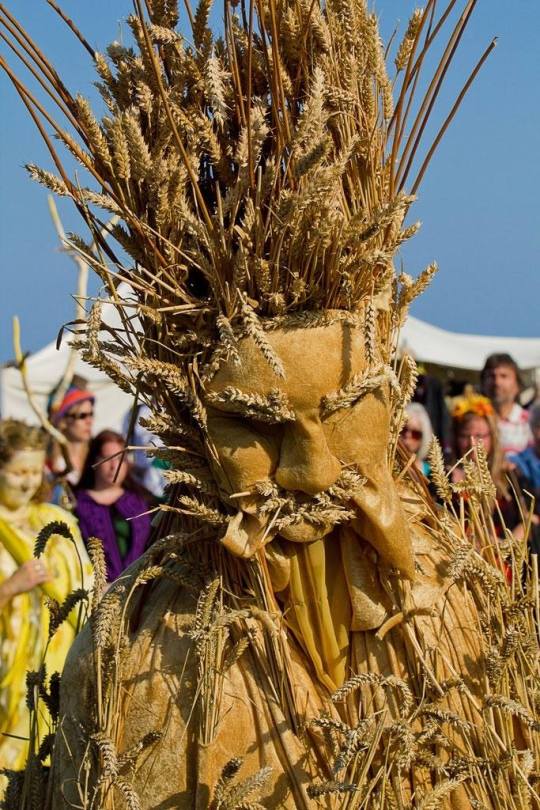
There comes to town, adorned with summer beauty,
the Weed-month, August.
It brings to the people Lammas day.
So comes the harvest-time, about another month,
high autumn, beautiful, burdened with fruits—
prosperity will be revealed fairly upon the earth. The Menologium, Anglo Saxon Calendar Poem
John Barleycorn 🌾
29 notes
·
View notes
Note
I have a question about search technique. Yours are like a super power.
When inquirers say they can't remember title or author, but have whole paragraphs from the fic, verbatim, that they've downloaded or saved : are these direct quotes searchable? If you enclose these excerpts from the fic in quote marks, will they pop up in a search using Google or another online search tool?
Thanks.
Hi anon! That's a great question, and we wish we could say Google was reliable but in recent history it is not. There are ways to search Google for fanfiction, which we have written about extensively here. Results can be spotty since not all websites and pages on a website are indexed on Google—though it has worked before!
So, when someone sends us exact quotes we typically locate them searching our own personal fic archives. It depends on the ask! Sometimes someone on our team will recognize a quote, or are able to search their own personal fanfiction libraries, or we sometimes get lucky with Google.
When in doubt, don't hesitate to send us your screenshots or quotes. We would love to help!
9 notes
·
View notes
Text
Checklist For Writing Essay:
Masterlist
BUY ME A COFFEE
More of a person note for me, when polishing off an essay to double check the criteria.
Times New Roman
Size 12
10% of word count over if needed.
Italicize works of art.
“_” for chapters/books.
Name of Artwork, Artist name, Date, Size, Location
Try to find images of the work with people/in the gallery space.
Spell out any number below 100 (eg. Three dimensional)
Double Spaced
(Not cheating to share your work with someone on the course and discuss)
Must use Footnotes, MHRA refrencing style
Footnotes sometimes count in word count DOUBLE CHECK
Footnote numbers should always appear after the full stop at the end of the relevant sentence, even when they refer to a point made
midsentence.
When writing visual analysis, consider closing your eyes as someone reads back what you’ve written about the artwork, and consider if you can clearly visualise in your mind from what you’ve written.
Paragraph organisation by: Intro/ paragraphs on separate ideas/ conclusion
Online walkthrough gallery. Make arguments/convince when writing, of what you see/ how you understand it.
Talk about materials used.
Space it inhabits and effect on observer.
Academic sources must be used.
Short comings in the essay/academic paper to be discussed and evaluated.
JSTOR
Website and access to academic papers usually needed to have uni library sign in. Some museums have sources too. Browse library or articles in library database.
Find interesting texts, then use and write about it. Footnotes included in work count.
Museum repository, Wikipedia to start.
WHAT IS MOST SIGNIFICANT TO YOU?
ADDITIONAL RESOURCES:
London Metropolitan Archives picture library, aka 'Collage' - all things London
London Metropolitan Archives youtube channel
BFI Player film archive - shorts and features from the BFI, national and regional archives
BFI Player - Britain on Film, with searchable map
RibaPix - UK's largest architectural photo library
Pathe Newsreel - great way of quickly diving into historical news items, and fascinating for the visuals as well as the thorough textual transcripts
British Cartoon Archive - 200,000 British editorial, socio-political, and pocket cartoons covering 200 years
Black in the Day - A submission based archive documenting the lives of black people living in the UK
Wellcome Library - not all but many items are digitised
For those students with a particular interest in museums and museum studies, check out our very own Mapping Museums website:
https://museweb.dcs.bbk.ac.uk/home
Researching Online: A Guide
Below are worked examples of how to do an essay or research project using only online resources.
Don’t spend ages looking for one article or book unless it is really essential and even then, you may not be able to get it, but you will find something related.
Vary your search terms, e.g. for the examples below: early modern, renaissance, reformation, sixteenth century might all be relevant.
Follow links in articles and on collections – often, footnotes in journals online may be hyperlinked to the item (especially in more recent publications), you can see similar items, or who has cited that work. For primary sources/collections, catalogues may suggest similar items too.
There will be dead ends and frustrations but persevere – there is lots of material out there.
Save things using a citation programme like Zotero or Mendeley
If you find something interesting and potentially useful for another topic, bank it for later
Be creative and use sources you might not have thought about before, for example the sound archive in the British Library and think across period and geography.
Google Scholar and on JSTOR/other platforms, Project Muse
which is another very good platform with loads of open access material.
USTC: the USTC is a database of early modern printed books across Europe
Interesting source:
#art gallery#writing#essay#paintings#art tag#art exhibition#art show#artwork#art#art hitory#essay writing#history#historical#artists#artists on tumblr#drawings#illustration#art style#writers#creative writing#writers on tumblr#writeblr#writers and poets#lecture#art history#photography#antiques#sculptor#sculpture#screen printing
17 notes
·
View notes